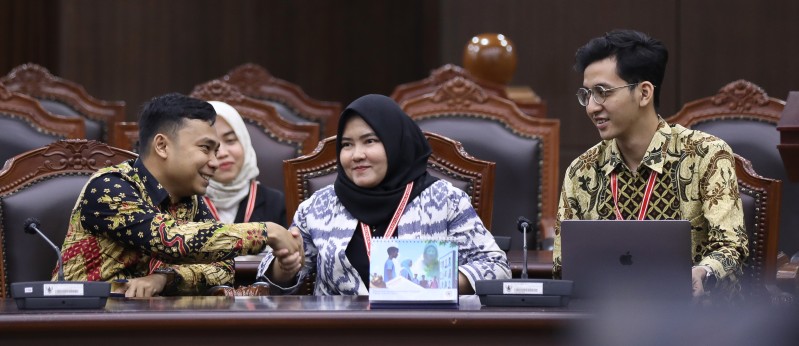The 2029 election is considered more competitive
New Regulations Change the Course of the Contest
The 2029 elections are considered more competitive since the Constitutional Court ruled to separate national and local elections. This policy is considered a structural change that allows the public to focus more on making their political choices. By separating the presidential, DPR RI, and DPD elections from regional head and DPRD elections, candidates can more freely express their visions and missions without having to compete in an overly crowded political atmosphere.
Many observers believe that the 2029 elections are more competitive because there is no longer an overlap between national and local issues in a single political contest. The time between the two types of elections allows the public to evaluate the performance of elected officials before returning to the polls. This provides an opportunity for voters to be more critical and rational in choosing leaders who best suit regional or national needs.
This reform has received praise from many academics, who believe that with a more focused campaign period, voter turnout could significantly increase. The 2029 elections are considered more competitive not only in terms of the number of participants, but also in the quality of the ideas offered by each candidate.
Presidential Threshold Abolished
Another Constitutional Court ruling that has significantly changed the political landscape is the elimination of the presidential threshold. By eliminating the requirement of 20 percent of legislative seats or 25 percent of the national vote as a requirement to nominate a presidential candidate, the 2029 election is considered more competitive, opening the door for medium-sized and small parties to participate in the presidential election.
This situation creates new space for various non-elitist political figures who were previously hindered by the regulation. The 2029 election is considered more competitive because prospective leaders are no longer subject to the power of a large coalition. Indonesian politics has entered a new phase where the contest of ideas can truly dominate the democratic stage.
The diversity of potential candidates in the upcoming election creates a new dynamic that encourages voters to conduct a more in-depth evaluation. With numerous choices and the absence of parliamentary seat restrictions, each candidate must truly convince the public with concrete programs, not just image-building.
E-Voting and Digital Technology
Digital transformation is also a major factor in the 2029 election being considered more competitive. The government and the General Elections Commission (KPU) have begun simulating the use of biometric-based e-voting, which integrates e-KTP (e-KTP) data, fingerprints, and facial recognition. If implemented nationally, this system will increase efficiency, speed up vote counting, and minimize the potential for fraud.
Political campaigns are also shifting from conventional media to the digital realm. Candidates are utilizing social media, artificial intelligence, and big data to reach voters in a personalized and targeted manner. The 2029 election is considered more competitive because campaign strategies are becoming more precise and interactive. Public engagement in online discussions is increasing, creating a new, more inclusive political space.
Technology is opening up greater opportunities for first-time voters to actively participate. They can quickly obtain information and easily compare candidate programs. Link Slot Ampmwin, as part of digital penetration in society, also reflects how the online world is shaping the political culture of the younger generation.
Internal Competition Between Political Parties

Political parties now face significant challenges to improve. With the removal of the presidential threshold, parties that previously only served as coalition partners can now nominate their own presidential and vice-presidential candidates. The 2029 election is considered more competitive because competition occurs not only between parties but also within each party.
Internal competition forces parties to conduct healthier and more open cadre development. Those who previously relied on political dynasties or single figures must now begin to build collective strength. The determination of presidential candidates is no longer a mere elite decision, but the result of a broader internal democratization process.
This has resulted in the emergence of new figures with clear track records in the social, educational, or economic sectors. The 2029 election is considered more competitive because the public can finally see that opportunities are no longer monopolized by a handful of repeating names. Political reform is now tangible, and it all starts within the parties.
The Role of Media and Political Education
Mass media and social media play a strategic role in ensuring that the 2029 elections are considered more competitive in terms of information. Various broadcasting institutions, online media, and YouTube channels are now the main tools for conveying debates, clarifications, and candidate work programs. Transparency and balance are key to maintaining the quality of democracy.
Read also: Modern Poutine Variations That Are More Tempting
On the other hand, civil society organizations and universities are becoming more active in providing political education to the public. Seminars, public discussions, and even training for political volunteers are becoming increasingly common. The 2029 elections are considered more competitive because the public is no longer passively receiving information, but is actively seeking out and filtering credible information.
This will make smear campaigns, hoaxes, and money politics increasingly difficult to carry out. Informed voters are the last bastion against the destruction of democracy. Quality leaders can only emerge if the public has the knowledge and courage to reject transactional politics.
The Spirit of Inclusive Politics and Representation
The 2029 elections are considered more competitive because they provide greater space for the representation of women, people with disabilities, and other minority groups. The issue of inclusivity, often overlooked, is now a key part of the campaign narrative. Political parties are encouraged to nominate figures from diverse backgrounds who reflect the true face of Indonesia.
Women are no longer merely candidates for legislative candidates, but are beginning to occupy strategic positions in party leadership and regional head nominations. This makes the 2029 election more competitive in terms of gender. Representation is a crucial point in determining whether democracy truly works for all groups or only for a small elite.
The issue of representation also encompasses underdeveloped regions that have previously had limited political access. Candidates from remote areas can now be more easily recognized through digital media. A more open candidate selection process also allows them to compete fairly. The 2029 election is considered more competitive because all voices have an equal opportunity to be heard.


